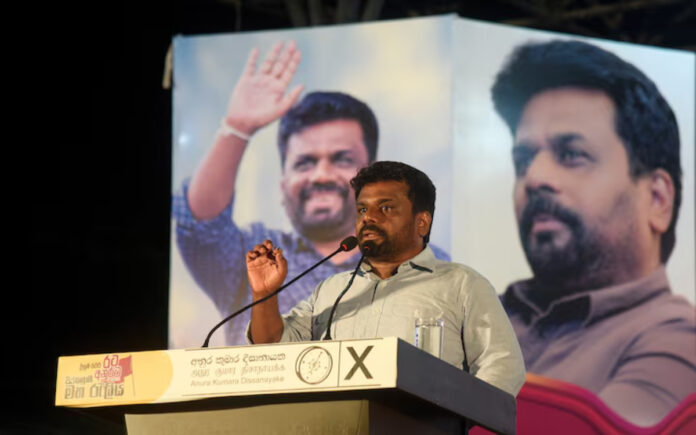Colombo: Anura Kumara Dissanayake has emerged as a political force in Sri Lanka, defying expectations by winning the presidential election on Sunday, despite lacking the political lineage of many rivals. His leftist anti-poverty policies and a firm commitment to combat corruption resonated with voters, propelling him to victory.
Though Dissanayake’s Janatha Vimukthi Peremuna (JVP) party holds just three seats in parliament, the 55-year-old candidate’s promises of stringent anti-corruption measures and expanded welfare initiatives proved influential. He garnered 1.27 million more votes than his nearest competitor, main opposition leader Sajith Premadasa, while incumbent President Ranil Wickremesinghe secured a distant third place.
Premadasa, the son of former President Ranasinghe Premadasa—who was assassinated during his term—was viewed as a contender tied to political dynasties. Wickremesinghe’s lineage also features prominently; his uncle, J R Jayewardene, previously served as both president and prime minister. In a similar vein, Namal Rajapaksa, the eldest son of two-time president Mahinda Rajapaksa, was among the 38 candidates vying for the position.
“There are people who think their family power will win this election but on Sept. 21, that family power, financial power, media power and state power will be defeated by people’s power,” Dissanayake declared ahead of the election. He is scheduled to take his oath early on Monday.
Dissanayake ran as the candidate for the National People’s Power (NPP) alliance, which includes the JVP, a party traditionally aligned with Marxist economic principles focusing on protectionism and state intervention. In recent years, however, the JVP has adopted more centrist positions.
His campaign drew large crowds, as he encouraged Sri Lankans to move beyond the hardships brought on by a severe economic crisis. “This vote was against corruption and mismanagement. People see transparency and efficiency in him when it comes to governance,” stated Thirangana Weerasinghe, a 28-year-old businessman.
Also Read | US and India Boost Military Cooperation with $3.9 Billion Drone Agreement
Hailing from a small farming family in Thambuttegama and armed with a degree in physical science, Dissanayake portrayed himself as a candidate for change. He promised to dissolve parliament within approximately 45 days of assuming power and to seek a fresh mandate through general elections.
“We are likely to see another election in the next couple of months,” noted Bhavani Fonseka, a senior researcher at Colombo’s Centre for Policy Alternatives. “We have to see whether he decides to stay with this prime minister and cabinet, appoints his own, or forms a caretaker government.”
Also Read | Russian Black Sea Fleet Executes Combat Drills Over the Black Sea
Dissanayake’s manifesto includes plans to revamp a debt restructuring program central to the International Monetary Fund’s $2.9 billion bailout and a commitment to tax reductions that have raised concerns among investors regarding his economic strategy. Nevertheless, he adopted a more conciliatory tone during campaign speeches, assuring voters that any changes would be made in consultation with the IMF and reaffirming his dedication to debt repayment.
The JVP has a tumultuous history, having led two failed insurrections in 1971 and 1988 against elected governments, resulting in thousands of deaths as security forces quelled the uprisings. Since then, the party has sought to integrate into mainstream politics. Dissanayake, who was not a leader at the time of those events, has refrained from commenting on the insurrections in recent years.



